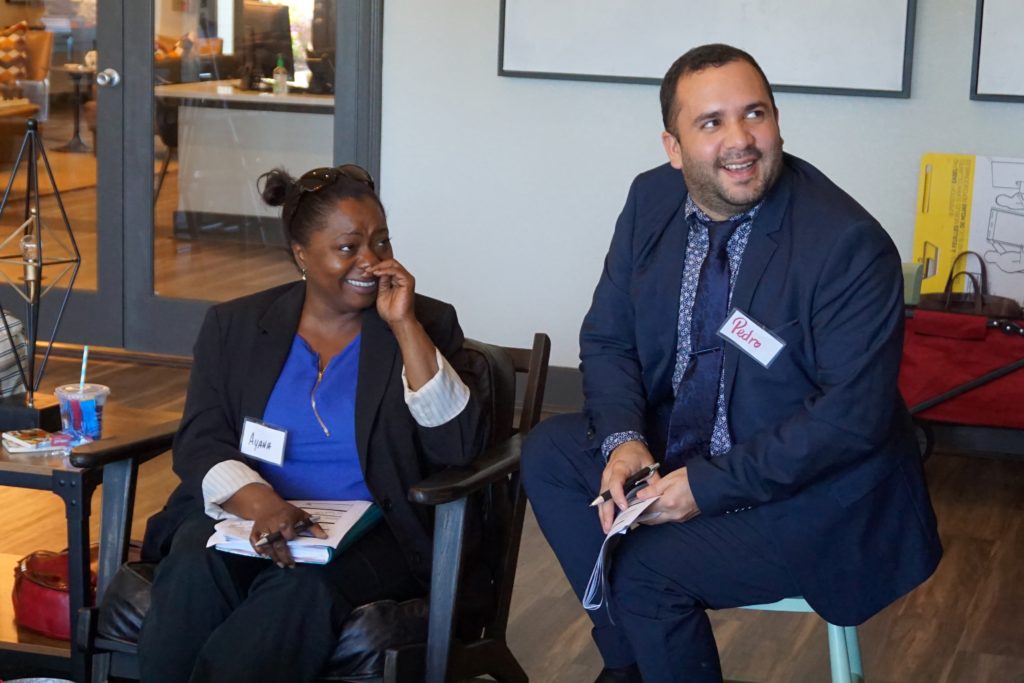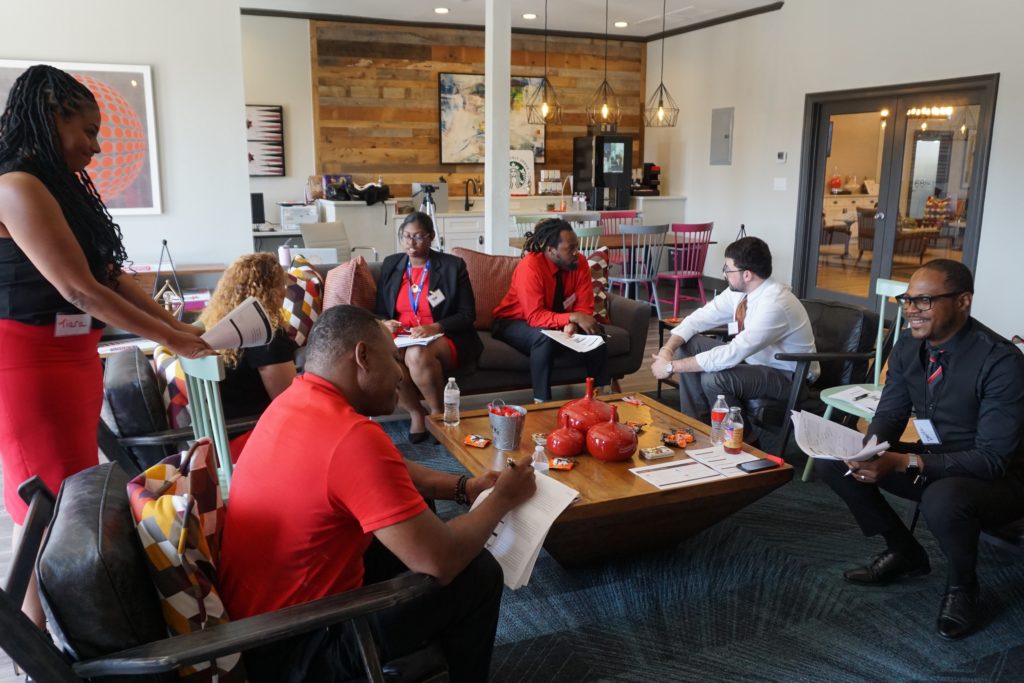How to Keep Employees Happy
Jessica Gordon Director of Learning & Development, The RADCO CompaniesThe age-old question...
“Why is turnover so high in multifamily?” It’s the question everyone in the industry keeps asking. As a newcomer to multifamily a few years back, I made it my mission to find out the answer. I posed a lot of questions to a lot of people, and after mulling over the common pain points they described, I found the problem was rooted in something very simple: there’s so much to know in this business!
In their first three months on the job, entry-level multifamily employees have to get used to the fact that this business is ever-changing. We often forget that our newest team members are suddenly dealing with real people who have real problems. Residents get married. Residents get divorced. Everything in life happens on a property, and it can be difficult to balance the professional and personal relationships involved — whether you’re just starting out or have many years under your belt.
“Everything in life happens on a property, and it can be difficult to balance the professional and personal relationships involved…”
You have to collect rent when you know someone might have lost their job. You have to have tough conversations, but still be a firm decision-maker in the end. With so many delicate variables to consider, it’s understandable that many people find the responsibilities too overwhelming to handle. It takes a special person to do all of it well.
However, there are many people who could truly make it — under the right management. With that in mind, I’ll cover the ways operators can transform their work cultures so that employees have the support they need to thrive.
Building relationships from the beginning.
From my experience at RADCO, we’ve found that employees are most inclined to stay at a company when they feel empowered in their roles. The best way to achieve this is to help them build substantial relationships from the very beginning. At RADCO, our team members always say there’s a “family atmosphere,” that they feel genuinely close to their colleagues. I think a large part of their tight-knit experience stems from the way we approach their first few days and weeks on the job.
At RADCO, we really work to make the onboarding process as meaningful as possible for new hires. It’s why we decided to transform our orientation program in 2018, making changes that would help our team members build collaborative relationships with co-workers and management. Our new onboarding program is much more interactive than before, giving new hires plenty of opportunities to break the ice as they learn key responsibilities.
“...we’ve found that employees are most inclined to stay at a company when they feel empowered in their roles.”
Naturally, new hires need to take a property tour and set up an email login, but we find it’s also critical that they discover who their best contacts are for issues spanning the organization. Given how many new skills and sensitivities there are to navigate when you’re starting out in multifamily, it’s very important that recent hires sense there are plenty of people who care to answer their questions.

At the same time, we also give our new starts an autonomous learning roadmap so that they can also develop an array of skills independently. We find it’s key to give new hires the assurance that we believe in their aptitude and won’t be watching them at every move.
No matter what role a person is starting in multifamily, managers should keep in mind that because it’s such a fast-moving business, there’s always a scenario the person hasn’t faced before. It’s crucial they have a person — or a resource — to turn to for help. However, the process of building a positive work culture certainly doesn’t stop with onboarding. After orientation winds down, it’s a prime time for managers to set clear expectations and establish a system of regular check-ins.
Clear expectations, consistent check-ins.
“Setting expectations” may sound like classic overbearing management, but at RADCO we use the phrase in a truly positive sense. Our managers communicate to new team members that they sincerely believe these recent hires have the ability to do the job well.
 When multifamily managers set the tone that everyone has something valuable to contribute to the workplace, team members can start pushing themselves and focusing on their strengths. To this end, it’s important that any difficult feedback they receive never seems to come out of the blue. Instead, RADCO believes it’s best practice for multifamily managers to arrange consistent check-ins with their direct reports.
When multifamily managers set the tone that everyone has something valuable to contribute to the workplace, team members can start pushing themselves and focusing on their strengths. To this end, it’s important that any difficult feedback they receive never seems to come out of the blue. Instead, RADCO believes it’s best practice for multifamily managers to arrange consistent check-ins with their direct reports.
By setting daily or weekly meetings, managers provide their team members with a clear path of communication — and the opportunity to track their success at various skills. The process also allows teams to build a cadence where employees feel comfortable stating any concerns they might have.
Additionally, having regular check-ins gives managers the framework they need to offer genuinely constructive feedback. At RADCO, we encourage our managers to start off these exchanges by giving a specific example of an assignment or project a direct report did well. This sets the stage that the supervisor appreciates their efforts and acknowledges their hard work.

“...having regular check-ins gives managers the framework they need to offer genuinely constructive feedback.”
Then, if there’s an area of work where the direct report could use improvement, the manager is best off once again providing a concrete example of a task that missed the mark. By offering specific scenarios and phrasing the guidance conscientiously, managers can really go far securing team member loyalty. In scheduling these meetings on a regular basis, multifamily managers set the tone that they’re here to listen — and advise — rather than let things simmer.
On this note, leveraging data and offering peer trainings are powerful ways to start building the kind of positive work culture people won’t think to leave.
Enlightening data, inspiring trainings.

In a digital age, it’s easier than ever before to tap into all kinds of data about a given property. As the team members conducting inspections at each community are collecting the same data, it’s a seamless process to compare numbers from across properties.
By focusing on the facts, you can improve your score in any category — while still maintaining a positive work culture. The secret is acknowledging a win first. You might tell your maintenance team members something like: “Overall, the average community is hitting a 70 in this category, but you did so fantastically, getting an 82%! How did you make this win happen?”
However, you have an opportunity to go a step further boosting the positivity — by broadcasting their accomplishment across communities. When you praise team members publicly, perhaps through an email newsletter, internal social media, or a company-wide meeting, your effort goes a long way in making people feel valued.
“When you praise team members publicly, perhaps through an email newsletter...your effort goes a long way in making people feel valued.”
After you celebrate your staff’s win, you can also seize the opportunity to change the course of disappointing data. This is your chance to ask conscientious questions about how a process unfolded and the kinds of changes that might make things smoother. By providing multifamily team members this delicate mix of praise and guidance, you can go far creating a trusting, collaborative work environment.
Returning to the importance of broadcasting accomplishments, RADCO has discovered there’s tremendous value in going a step beyond public praise and actually establishing peer training programs. By empowering team members to be teachers in their own right, you’re signalling that you value their abilities and support their career growth.
RADCO’s peer-led Ambassador Program focuses on safety and soft skills, with every lesson aligning back to our company values. The topic of the month may involve challenging authority, handling irate customers — topics that apply company-wide — and one or several of our team members demonstrate how to solve the problem.
While the content is always relevant and accessible, the Ambassador Program really shines because of the platform it gives employees to network with people outside of their community. When we select team members to participate in the Ambassador Program, they have the opportunity to visit other communities and share their knowledge. Just by having a bagel or coffee with somebody from a different property, they can spend time with someone new and feel even more that they’re part of a close-knit RADCO family.
We also actively use our internal social channel, Yammer, to share company news and team accomplishments. At RADCO, we find it helps people feel connected to the greater organization rather than isolated within their own community. Beyond bypassing isolation, we also solve the problem of consistency, as we’re able to seamlessly share best practices across communities.
With relationship building, feedback, data, and training methods behind us, it’s time to cover the most important step of all toward building a positive work culture. In a word? Listening.
The power of listening.
In a fast-changing industry like multifamily, it’s so important to show that you care to pause and listen to team members. When I started at RADCO, I was brand new to multifamily. Ironically, as Director of Learning, I had the absolute most to learn. So, I asked myself: “how do I create an on-site learning program when the people already there have the most knowledge?”
I had faith that the answers would come if I asked questions of the right people — and listened carefully. My colleagues in management helped me identify team members who had expertise in core maintenance areas, and I set up meetings with them. I heard about the challenges and opportunities they faced in their day-to-day, and I realized their stories would be relatable to others in the company.
That process helped our Ambassador Program get off the ground. Now, I find that the most rewarding part of my job is when someone says “thank you” for the program or raises their hand to participate in part of the activity. To see them succeed and show interest is the best part of my day.
It shows me we’re doing something right at RADCO — that our team members have so much on their plate, not to mention their own personal lives, and they still care enough to be active in our community events. In my view, it all boils down to the way we listen to our staff. Once this becomes the norm at a company, it’s truly possible to build the kind of work culture that keeps people happy.